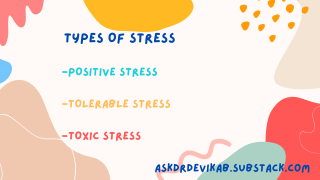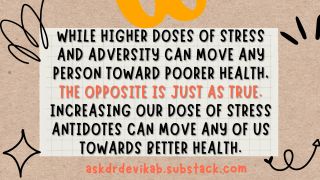Stress
Stress and Health: What You Need to Know
How stress affects our health, and what we can do about it.
Posted September 7, 2023 Reviewed by Gary Drevitch
Key points
- When something stressful happens, we can have 1 of 4 stress responses: freeze, fight, flight, or affiliate.
- Some stress is helpful, but excessive activation of the stress response can lead to bodily wear and tear.
- When this happens, the stress response system goes from being life-saving to potentially health-damaging.
By Rachel Gilgoff, MD, FAAP, and Devika Bhushan, MD, FAAP
Part 1 of a 4-part series.
Understanding how stress impacts our health, and the powerful antidotes we have at our disposal, is more critical today than it perhaps ever has been.
Stress and Health: The Basics
Stress affects all of us—even babies. Since the stress response is crucial for helping us survive, it’s among our most basic and hardwired biological responses.
When something stressful happens—let’s say, a fight with a loved one or witnessing a threat like gun violence—our brains and bodies can go into one of four stress responses: freeze, fight, flight, or affiliate (bonding, people-pleasing), driven by hormones like cortisol, adrenaline, and oxytocin. Afterward, even simple reminders of the stressful experience—a sudden loud noise or smoky smell—can trigger that same stress response.
All of us will experience these responses at some point in time. They are a normal part of being human and they help us cope with stressors.
- Freeze. This is the most basic and evolutionarily conserved stress response. If we can’t escape from a threat, we may become immobile, withdraw, dissociate, or faint. Think of an animal playing dead with the hope that the predator loses interest and moves on, or a deer-in-headlights. In our world, this can feel like floating above or being separate from a stressful event (which can be protective)—or fainting at the sight of blood.
- Fight or flight. In this response, our heart rates and blood pressure go up, we breathe faster, our palms get sweaty, and we send more energy to our brain and muscles (and away from our guts) to be able to either fight or run away. This can be helpful, such as before a big race or performance. However, if the stress response is very strong, our "thinking" brain (controlling higher-order processes like planning and impulse control) may go offline and instead, we may be ruled by emotion and instinct. This can save our lives when we see a bear in the woods. However, in our modern world, this can also show up as our "losing it" at a loved one—or in our toddler’s temper tantrum.
- Affiliate. This is the most advanced stress response and involves connecting with others in times of possible danger. This can look like a parent putting themselves at risk to help their child (tend), or making new alliances against a common threat (befriend). This response can sometimes also lead to being a "people pleaser," seeking to avoid conflict, sometimes hiding one’s true feelings, and sacrificing one’s own needs. But this impulse to reach out to others for support can overall be healthy and helpful, leading to fewer freezing, fighting, or flighting responses.

Not all stress is bad
Some kinds of stress experiences are actually good for us to have; they can help us be healthier.
For instance, when we face a challenge like a race or a big presentation at work, the stress response comes online to help us succeed and then afterward, is quickly dialed back down. This experience helps build motivation and our resilience "muscles," so we can practice how to respond adaptively in the face of a future challenge. This kind of experience is an example of positive stress.
When something unsafe happens to us, like witnessing a burglary, this decisively activates our stress response system. However, if we have enough of a support system and coping tools, we can eventually learn to feel safe again and the stress response system goes back to baseline. This is known as tolerable stress.
Of note, our previous experiences with stress and resilience and current coping strategies can shape the way we respond to future stressors—so the same stressor (witnessing a burglary) might show up as one person’s tolerable stress experience and as another’s toxic stress (see below) response.
What happens when there’s too much stress
At the moment, the stress response can be life-saving, like when we face a predator. However, repeated, prolonged, or excessive activation of the stress response system can lead to wear and tear on our physiologic systems. If someone’s fight-or-flight or freeze responses become activated over and over again and don’t get dialed back down through the inputs, their brains and bodies can get "stuck" in survival mode. When this happens, the stress response system goes from being helpful and life-saving to potentially being health-damaging.
This repeated or prolonged activation of the threat detection and stress response system—called the toxic stress response—can lead to changes in our brains, hormones, metabolic processes, immune system, and even our genes, speeding up aging at a cellular level.
These biological changes can potentially lead to poorer mental and physical health—with increased risk for health conditions ranging from heart disease and stroke, chronic lung diseases, diabetes, hepatitis, cancer, arthritis, dementia, kidney disease, frequent infections, obesity, mood and anxiety disorders, eating disorders, substance use disorders, among others.
The good news
What’s crucial to know is that even after the toxic stress response is in place, its impacts are still very much preventable and reversible.
While higher doses of stress and adversity can move any person toward poorer health, the opposite is just as true: Increasing our dose of resilience strategies and stress antidotes can move any of us toward better health.

Simple and powerful antidotes to toxic stress, like safety, connection, coping skills, and stress regulation strategies ranging from anti-inflammatory nutrition to better sleep, can help return all axes of the biological stress response (and related changes) to a healthier place.
Acting to reverse the biological root causes of poorer health, these antidotes act to powerfully move the body towards greater well-being and health, no matter what someone has faced.
A version of this post for caregivers appears on the American Academy of Pediatrics’ parent-facing website, healthychildren.org. A version of this post also appeared on Ask Dr Devika B, my well-being newsletter.
Rachel Gilgoff, MD, FAAP is an integrative medicine specialist, child abuse pediatrician, researcher, and science writer. She recently partnered with GetzWell pediatrics to start the StressWell Clinic: From Stress to Wellness.
To learn more, see our video on stress and health.




